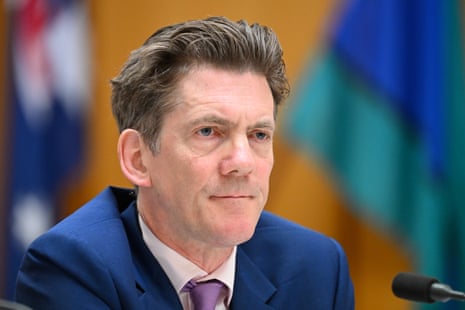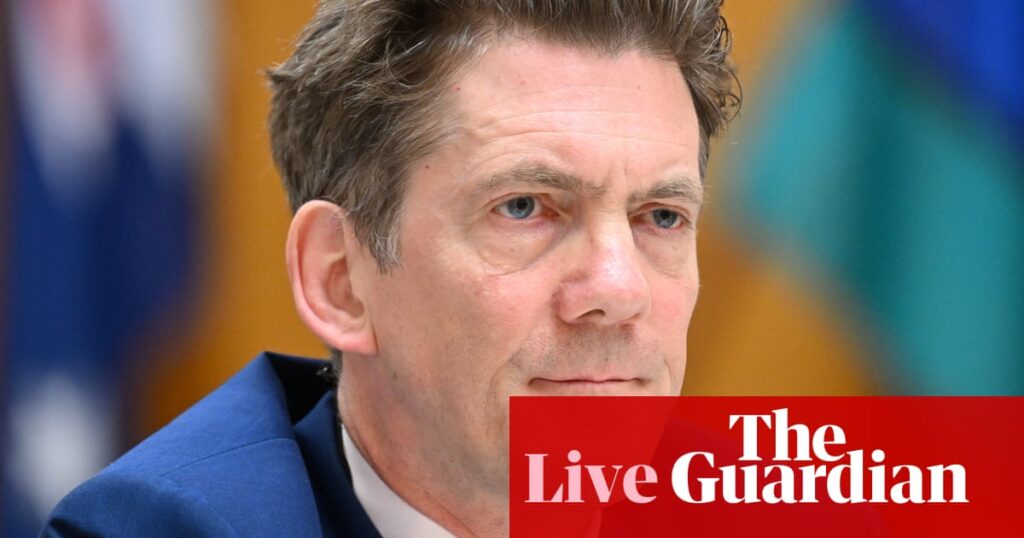Trump’s trade war will have ‘profound’ effects, RBA deputy governor warns
Patrick Commins
The Reserve Bank deputy governor, Andrew Hauser, has warned that Donald Trump’s trade war will have a “profound” impact on the global economy.
Speaking at the Australian Conference of Economists this morning, Hauser said it was “puzzling” that investors seemed unperturbed by the tectonic shifts in the global economic order.
Sharemarkets are higher now than they were before Trump announced his extraordinary tariff rates in early April’s “liberation day”.
“How worried are we about it (Trump’s trade policies)? We are very, very focused on it, the level of uncertainty is clearly elevated. The first round effects of these changes in US tariffs are probably relatively minor, but the effects on a broader global economy are profound,” he said.
Hauser, who joined the RBA from the Bank of England, used the experience of Brexit to explain how it can take years for the full impact of major shocks like Trump’s tariffs to become clear.
The day after Brexit happened, everyone thought the world would end, and it didn’t. But 10 years on, you’re seeing the profound effects of some of those changes for sustainable growth rates and for fundamental things in the economy.
Hauser’s comments came a day after the RBA board defied expectations to hold rates, but the official offered no fresh insights into what the central bank was thinking on that score.

Key events
Look at this tiny dog that helped save a hiker trapped in a glacier
A small pet dog has been hailed a “four-legged hero” after his owner fell down an icy crevasse in the Swiss Alps.
The helicopter company Air Zermatt said:
While the man was stuck in the glacier ice, his faithful companion … was left at the edge of the crevasse.
They credited the pup for drawing their attention to the location of the hiker, who was then extracted and taken to hospital.
Read the full story from Deborah Cole here:
Australian shares dip as Trump’s tariffs target copper
The Australia share market has lost ground as Donald Trump expands his trade war with steep new tariffs on copper and pharmaceuticals.
At midday on Wednesday, the benchmark S&P/ASX200 index was down 27.2 points, or 0.32%, to 8,565.3, while the broader All Ordinaries lost 25.5 points, or 0.29%, to 8,803.2.
Overnight, the US president said drug manufacturers would be given a year or so to move manufacturing to the US, otherwise they would “tariffed at a very, very high rate, like 200%”.
Trump also flagged the White House would be imposing 50% tariffs on copper, which the US commerce secretary, Howard Lutnick, said could begin at the end of July or start of August.
Copper prices surged after the comments, ending the trading day up 13.1% for their strongest one-day gain since 1989.
Australia is a major copper producer but exports very little to the United States, with most going to China and other Asian-Pacific countries. The US gets most of its copper from Chile.
– Australian Associated Press
NZ Reserve Bank follows Australia and holds rate steady
New Zealand’s central bank has ended a run of six consecutive cuts, holding the official cash rate at 3.25%.
In a decision announced on Wednesday, the Reserve Bank of New Zealand (RBNZ) followed Australia’s lead from a day earlier, opting to take stock given the uncertain economic outlook.
The decision is seen as not a rate cut denied – just a rate cut delayed.
“If medium-term inflation pressures continue to ease as projected, the (RBNZ) expects to lower the official cash rate further,” the RBNZ’s governor, Christian Hawkesby, said.
Like Australia, headline inflation in New Zealand is back inside the RBNZ’s target band, last measured at 2.5% in April. But NZ has taken a decidedly different economic path in the post-pandemic tumult, falling into a deep recession in 2024.
The RBNZ cut from a high of 5.5% to current levels in the past six meetings.
– Australian Associated Press
More on the Murujuga rock art world heritage bid
An ancient First Nations rock art collection could become a World Heritage-listed site as the federal government ramps up lobbying efforts.
Environment Minister Murray Watt will travel to the United Nations Educational, Scientific and Cultural Organisation (UNESCO) headquarters in France to try get the Murujuga rock art landscape in Western Australia listed as a World Heritage site.
Unesco advisers recommended in May that the nomination be blocked and referred back to Australia until nearby “degrading acidic emissions”, including those from a Woodside gas plant, were stopped.
But Watt, who said Australia had consistently shown international leadership in promoting First Nations people and combating climate change, wants to update the committee on conservation at Murujuga.
– with Australian Associated Press

Graham Readfearn
Greens leader says gas project approval should be rescinded to help Murujuga rock art world heritage bid
The Greens leader, Larissa Waters, says the environment minister, Murray Watt, should rescind his provisional approval of Woodside’s North West Shelf extension to give the nearby ancient Murujuga rock art a better chance of gaining world heritage status.
Watt is en route to Paris to lobby Unesco and members of the 21-country world heritage committee, who will decide sometime late Friday or early Saturday whether to put the Murujuga Cultural Landscape in the Pilbara region on the coveted world heritage list. Waters said:
We want to see this global treasure listed as world heritage. What we don’t want is to see it destroyed by acidic emissions from Woodside.
To give Murujuga’s ancient rock art the best chance of world heritage listing, Minister Watt should cancel the draft approval for Woodside’s 45-year extension on operating its gas proposal.
Unesco’s advisers have recommended the nomination of Murujuga be referred back to Australia for it to “ensure the total removal of degrading acidic emissions, currently impacting upon the petroglyphs”.
Watt has provisionally approved Woodside’s 45-year extension, but told the Guardian yesterday his department was still in discussion with Woodside over the conditions placed on the approval. The details of the conditions are not public, but they relate to the emissions from Woodside’s Karratha gas plant.
Watt and the Murujuga Aboriginal Corporation all argue Unesco’s advisers have relied on “factual inaccuracies” and say a monitoring program shows there’s no ongoing acidic emissions at the site.
Waters said the Greens were standing beside the Save Our Songlines group, which is also in Paris to ask the committee to hold to the recommendations.
Here’s everything you need to know on the issue just days ahead of the decisive meeting:
Muted buildup to Origin decider
Happy rugby league. With less than eight hours to go until tonight’s series decider, my colleague Jack Snape writes:
Personal adversity may have defined the buildup to the third State of Origin clash in Sydney on Wednesday, but in the tradition of rugby league’s great contest the bonds within a team will determine the winner of this year’s shield.
The shock death of the father of the Queensland captain, Cameron Munster, on the weekend, six months after the dad of the coach, Billy Slater, also passed away, has changed the tone in the countdown to kick-off.
There has been no talk of grubs, and fewer war analogies. When an eager journalist asked the Maroons coach whether he would “run a few missiles” at Blues marauder Payne Haas, who is managing a back injury and has trained only lightly in the lead-up, Slater gave him a withering look.
Guardian Australia will, of course, be blogging the finale live. Join my colleague Jonathan Howcroft here later.
Read more here:
Sydney’s Downing Centre court complex closed until ‘late 2025’ after water damage
Sydney’s Downing Centre will be closed until “at least late 2025” after a burst water main flooded the centre and damaged the substation that powered it.
Last month a Sydney Water main burst outside the local and district court on Castlereagh St, flooding the centre and damaging an AusGrid substation, the Department of Communities and Justice said in a statement.
An electrical transformer and switchboard – two critical pieces of electrical and mechanical infrastructure – have to be replaced, electrical engineers identified in an inspection of the building. It is anticipated the process will extend into late 2025.
The building is still disconnected from the substation, with no confirmation on when power will be restored. The statement continues:
At this stage, the Downing Centre is likely to remain closed until at least late 2025 to ensure the building is safe and fully functional.
This closure period will also allow for upgrades to the Downing Centre to be brought forward, including improvements to public spaces and courtrooms.
Matters listed in the Downing Centre are relocated to alternative locations including John Maddison tower, Central court, King Street and Darlinghurst courts.
Work is also under way to secure more permanent locations for jury assembly, and heads of jurisdiction continue to work closely with the Department of Communities and Justice to facilitate access to justice.
Complaints rise again as telcos frustrate customers
Australians are becoming more frustrated with their phone providers, as the number of complaints escalated to the industry ombudsman when telcos can’t solve them continues to rise.
Analysis from the communications watchdog released today showed the rate of customer complaints being referred to the Telecommunications Industry Ombudsman (TIO) has risen for the third consecutive quarter.
The report from the Australian Communications and Media Authority (Acma) says 7.1% of customer complaints were referred to the ombudsman, up from 6.9% in the previous quarter. Referring a complaint to the TIO means the issue was not able to be resolved between customers and their provider.
Two of the nation’s biggest telcos fared particularly poorly in the analysis, with Optus (31st) and TPG (34th) occupying spots near the bottom of the 36 ranked companies for rate of referred complaints.
Telstra – Australia’s biggest provider – was 18th, with 31 complaints per 10,000 services.
The report highlights a near-sevenfold increase in the rate of complaints about the worst-performing company being escalated to the industry ombudsman. Circles.Life racked up 152 complaints per 10,000 services – the most escalations out of the nation’s 36 largest telcos in the March 2025 quarter.
But its former customers may receive a reprieve – Circles.Life shut up shop earlier this year. Its customer accounts were acquired by larger provider Amaysim, which finished above the nation’s big-three telcos Telstra, Optus and TPG in Acma’s complaints-handling performance table.
That said, Amaysim was acquired by Optus in 2021 and uses the larger telco’s network, as did Circles.Life.
– Australian Associated Press
Travellers no longer required to take off shoes for security at US airports
For the first time in almost 20 years, travellers are no longer required to take off their shoes during security screenings at US airports, Kristi Noem, the Department of Homeland Security secretary, announced on Tuesday.
The Transportation Security Administration (TSA) has abandoned the additional security step that has for years bedevilled anyone passing through US airports, according to media reports.
The move puts an end to a security screening mandate put in place almost two decades ago, several years after “shoe bomber” Richard Reid’s failed attempt to take down a flight from Paris to Miami in late 2001.
“We expect this change will drastically decrease passenger wait times at our TSA checkpoints, leading to a more pleasant and efficient passenger experience,” Noem said in a statement.

Graham Readfearn
Australians could cut power bills by 90% if they made their homes more energy efficient, report finds
Luke Menzel, the chief executive officer of the Energy Efficiency Council, and other energy experts say political noise has often overshadowed the role of energy efficiency in Australian homes and how to cut rising household bills.
The latest of several reports to make the case for boosting energy efficiency is from the Institute for Energy Economics and Financial Analysis (IEEFA).
IEEFA found Australian households could cut their power bills by more than 90% by implementing a range of energy efficiency measures.
Released on Wednesday, the report calculated potential savings of between 82% and 94% if households installed solar and a home battery and used efficient appliances – such as heat pumps, air-conditioners and electric induction cooktops.
Read more:
Speed limits reduced on local streets in Sydney’s inner west
The speed limit has been reduced from 50km/h to 40km/h on local streets in Sydney’s inner west this week.
The change applies to local streets in Enmore, Tempe, Sydenham, Marrickville and parts of St Peters and Petersham.
Inner West mayor Darcy Byrne said:
This reduction in speed limits on local streets will reduce crashes and fatalities while having almost zero impact on travel times.
Local people know that the vast majority of travel time delays is caused by sitting idle in traffic, not the speed that you can drive at.
Further still, in most of our local streets the narrowness means that it is not possible to travel safely at 50km per hour.
Victoria Road, Enmore Road, Bedwin Road and Edgeware Road will be reduced from 60km/h to 50km/h.
Transport for NSW is funding the change.
Regional NSW art gallery eyeing cuts amid funding shortfall
At one of Australia’s foremost regional galleries, volunteers are helping carefully unpack artworks for an upcoming exhibition.
Armidale’s New England Regional Art Museum (known as NERAM) stages more than 30 shows each year, with staff and volunteers installing Lost in Palm Springs, which celebrates the desert landscape and architecture of California.
But having missed out on New South Wales government funding, NERAM may be forced to cut back on shows like this.
The gallery has relied on about $80,000 in annual state funding over the last decade, but it’s one of more than a dozen regional galleries in NSW that has recently missed out in the government’s four year funding program.
While many of these art institutions are run by local councils, NERAM is independent, without local government money to fall back on.
Director Rachael Parsons is working out what to do if a last-ditch two-year funding round is unsuccessful. She said:
If we are unable to find a last minute donor or brilliant idea to bring in more revenue, we are looking at what we cut.
Budget cuts would likely mean fewer exhibitions and reduced public programs at the gallery, which is a major tourist attraction and a hub for the town’s cultural life, Parsons said.
– via Australian Associated Press
Read more:
Trump’s trade war will have ‘profound’ effects, RBA deputy governor warns

Patrick Commins
The Reserve Bank deputy governor, Andrew Hauser, has warned that Donald Trump’s trade war will have a “profound” impact on the global economy.
Speaking at the Australian Conference of Economists this morning, Hauser said it was “puzzling” that investors seemed unperturbed by the tectonic shifts in the global economic order.
Sharemarkets are higher now than they were before Trump announced his extraordinary tariff rates in early April’s “liberation day”.
“How worried are we about it (Trump’s trade policies)? We are very, very focused on it, the level of uncertainty is clearly elevated. The first round effects of these changes in US tariffs are probably relatively minor, but the effects on a broader global economy are profound,” he said.
Hauser, who joined the RBA from the Bank of England, used the experience of Brexit to explain how it can take years for the full impact of major shocks like Trump’s tariffs to become clear.
The day after Brexit happened, everyone thought the world would end, and it didn’t. But 10 years on, you’re seeing the profound effects of some of those changes for sustainable growth rates and for fundamental things in the economy.
Hauser’s comments came a day after the RBA board defied expectations to hold rates, but the official offered no fresh insights into what the central bank was thinking on that score.
In pictures – traffic chaos after collision on Sydney Harbour Bridge
More photos are in of the traffic around the Sydney Harbour Bridge. New South Wales police warned traffic would be affected in both directions after a four-vehicle crash on the bridge during peak hour this morning.
Qantas confirms 5.7 million customers affected by cyber-attack

Josh Taylor
Qantas has begun informing customers what specific data of theirs was taken in the cyber-attack last week, with 1.7 million of the 5.7 million customers having more data than previously reported including meal preferences, gender, and addresses for delivering misplaced luggage.
In an update on Wednesday, the airline said it had progressed a forensic analysis of the customer data in the compromised system, and as of yet there had been no evidence that the data had been released publicly.
The number of customers affected has narrowed down to 5.7 million after removing duplicate records.
Four million of these customer records are limited to name, email address and Qantas frequent flyer number, with the majority including their tier, and a minority including points balance and status credits.
For the remaining 1.7 million their records include some combination of the above, plus:
-
Address – 1.3 million. This is a combination of residential addresses and business addresses including hotels for misplaced baggage delivery.
-
Date of birth – 1.1 million
-
Phone number (mobile, landline and/or business) – 900,000
-
Gender – 400,000. This is separate to other gender identifiers like name and salutation.
-
Meal preferences – 10,000
Qantas chief executive Vanessa Hudson said:
Our absolute focus since the incident has been to understand what data has been compromised for each of the 5.7 million impacted customers and to share this with them as soon as possible.
From today we are reaching out to customers to notify them of the specific personal data fields that were held in the compromised system and offer advice on how they can access the necessary support services.


